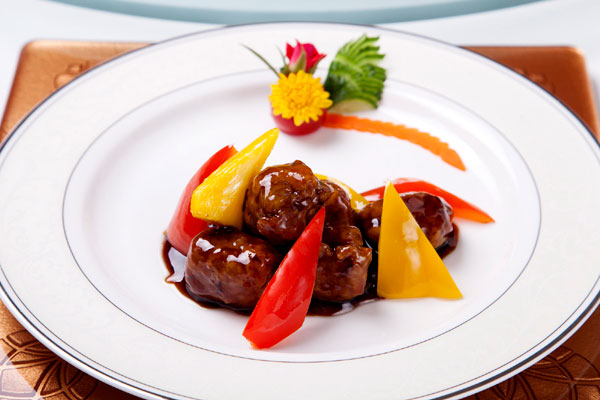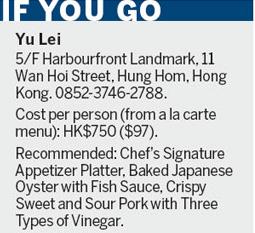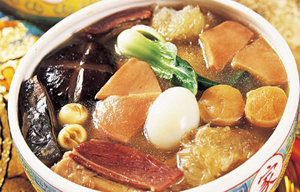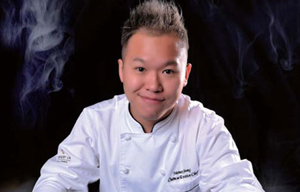Flower power
 |
|
Crispy sweet and sour pork (above) are two representative dishes of Yu Lei restaurant in Hong Kong. [Photo by Rebecca Lo/For China Daily] |
If we truly eat with our eyes, then Japanese chefs have an advantage: Many are artists when it comes to presentation.
Executive chef Miki Imagawa of Yu Lei is a stellar example of the culinary artisans from Japan. After less than a year at the helm of the Chinese restaurant in Hung Hom, he had already garnered a Michelin star. I was curious to see how he managed such a feat, as I understood he had worked exclusively in Japan until relocating to Hong Kong to open Yu Lei.
The restaurant is one of three in the K.O. Dining Group's complex that takes up the entire fifth floor of Harbourfront Landmark. The others include Messina, an Italian fine dining establishment, and Kazuo Okada, a kaiseki restaurant named after K.O. Dining's founder, the Universal Entertainment tycoon.
Like the other two establishments, the 110-seat Yu Lei is comprised of private dining rooms and an open hall with broad panoramas of Victoria Harbor. Two of the five private rooms boast sea views. Each contains its own powder room and soft seating area for guests to enjoy the ultimate in privacy.
Yu Lei's theme features Chinese flowers, and each private room is dominated by a large floor-to-ceiling painting of a different bloom. After being seated in the orchid room, I noticed that even the ceiling was decorated with orchids in relief. 
We started with Imagawa's signature platter. While its content changes seasonally or according to his artistic preferences of the day, it is always beautifully arranged. Our plate that day consisted of saltwater shrimp, bean curd roll and conch, artfully nestled together with a purple orchid to form the base of a bouquet. Spreading upwards were leaves and stems carved from cucumber and real chrysanthemum blooms.
It was so pretty that I didn't want to eat it. To delay the inevitable, I took some of the chrysanthemum petals and spread the edible flower over the dish, along with some in my Iron Buddha tea.
The shrimp was plump and echoed the sea, while the crunchy vegetables gave the bean curd roll texture and was a flavorful medley. The sweet petals went well with all the produce, giving them an added layer of freshness.
Next was the largest oyster I had ever seen, accompanied by yellow and green zucchini cut into frangipani-like medallions. The sauce, a rich yet lightly fragranced blanket made with Japanese soy sauce, was the highlight of the dish as it complemented both the succulent seafood and the firm squash. Imagawa only receives 20 of these oysters jet fresh from Japan daily and we were lucky to try them as they rank as one of the most popular menu items.
Crispy sweet and sour pork, another signature dish of Yu Lei, was set before us. Imagawa's version of the Cantonese classic was drenched in three different types of vinegar to give it a distinctive tanginess. The boneless morsels still retained their crunchy deep-fried exterior, giving way to tender pork. The deep burgundy of the meat was set off with red and yellow sweet bell peppers.
To accompany the robust flavor of the pork, we had a side of preserved vegetable and dried bean curd with edamame. The bean curd particularly worked well with the pork's sauce, helping to offset its intensity.
Another decadent dish was baked Boston lobster with fermented bean curd and cream sauce. Served with carrots, broccoli and taro, it was smothered in creamy gooeyness and topped with gold leaf for an extra touch of luxury. I loved how the taro was geometrically carved to contrast against the natural shape of the broccoli. The lobster itself was perfectly cooked to bring out its sweet delicacy.
After such a meal, I understood why Yu Lei is held in such high regard by foodies. The flair and craftsmanship that Imagawa brings to every dish really does elevate them into works of art.


















